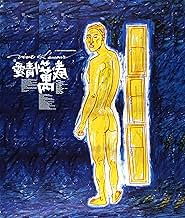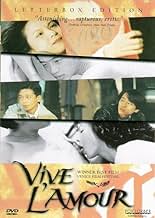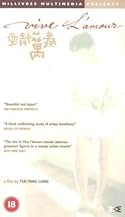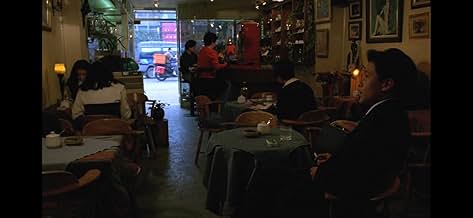Three lonely young denizens of Taipei unknowingly share an apartment used for sexual trysts.Three lonely young denizens of Taipei unknowingly share an apartment used for sexual trysts.Three lonely young denizens of Taipei unknowingly share an apartment used for sexual trysts.
- Awards
- 9 wins & 3 nominations
Chen Chao-jung
- Ah-jung
- (as Chao-jung Chen)
Yi-ching Lu
- Waitress
- (uncredited)
- Director
- Writers
- All cast & crew
- Production, box office & more at IMDbPro
Storyline
Did you know
- TriviaThere is no spoken dialogue for the first 23 minutes.
- ConnectionsFeatured in Century of Cinema: Naamsaang-neuiseung (1996)
Featured review
One of the best of Tsai Ming-liang's glacial case studies of contemporary isolation and alienation in Taipei/the world, VIVE L'AMOUR is gripping in spite of it's extreme slowness (his work shares this quality with Tarkovsky or Antonioni). Tsai's work is superficially very chilly and ultimately heartbreaking - though Tsai also (as always) manages to also sneak in a little deadpan humor, which in this case includes the rather ironic translated title.
Three young, outwardly successful Taiwanese happen to cross paths - unknowingly at first - in the empty Taipei condominium one (a real estate agent) is attempting to sell. Through a bare minimum in dialogue - VIVE L'AMOUR is essentially a silent film until about 20 minutes in - Tsai charts their isolation and fumbling attempts at various kinds of human connection and finding some personal sort of peace. Tsai's scenario and characters are globalized, stripped of most marks of identity, and very much adrift, and their growth (or lack of it) is communicated through sparse forms of acting, direction and cinematography that reinvents seemingly antiquated forms of film-making (again, silent film) into a new-millennial era. In this, Tsai crafts a sort of haunted, elegaic drama that slides around the limitations of language, inhabiting a dreamlike, if also very dark, psychological territory.
Typically Tsai uses no musical score, and the dialog is very sparse, with the film favoring the natural sound of whatever environment the characters find themselves in, so the many memorable scenes do tend to sneak up on you. The finale is unforgettable.
Three young, outwardly successful Taiwanese happen to cross paths - unknowingly at first - in the empty Taipei condominium one (a real estate agent) is attempting to sell. Through a bare minimum in dialogue - VIVE L'AMOUR is essentially a silent film until about 20 minutes in - Tsai charts their isolation and fumbling attempts at various kinds of human connection and finding some personal sort of peace. Tsai's scenario and characters are globalized, stripped of most marks of identity, and very much adrift, and their growth (or lack of it) is communicated through sparse forms of acting, direction and cinematography that reinvents seemingly antiquated forms of film-making (again, silent film) into a new-millennial era. In this, Tsai crafts a sort of haunted, elegaic drama that slides around the limitations of language, inhabiting a dreamlike, if also very dark, psychological territory.
Typically Tsai uses no musical score, and the dialog is very sparse, with the film favoring the natural sound of whatever environment the characters find themselves in, so the many memorable scenes do tend to sneak up on you. The finale is unforgettable.
- How long is Vive L'Amour?Powered by Alexa
Details
Contribute to this page
Suggest an edit or add missing content












